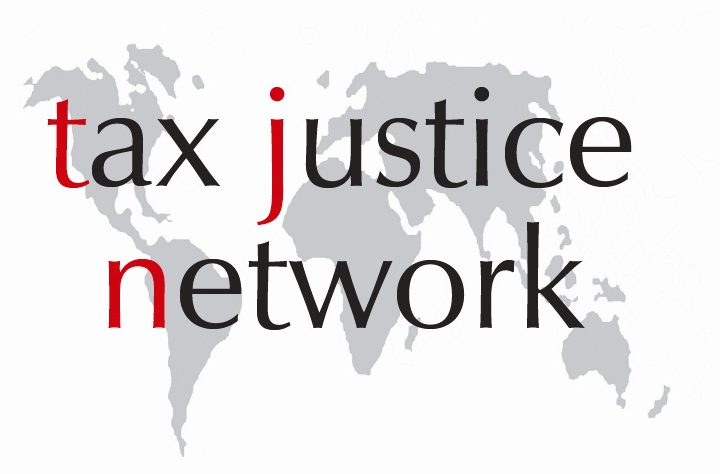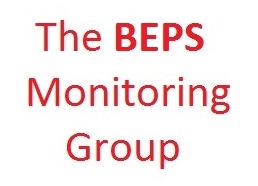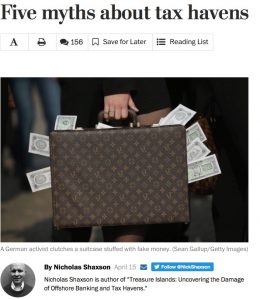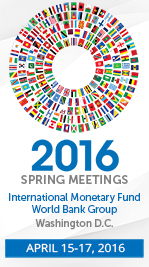We love this cartoon from this week’s edition of The Economist, which comes from a lengthy article about the forthcoming anti-corruption summit in London. Continue reading “The Economist – How to crack a shell”
We love this cartoon from this week’s edition of The Economist, which comes from a lengthy article about the forthcoming anti-corruption summit in London. Continue reading “The Economist – How to crack a shell”
As Britain prepares to host a global Corruption Summit in London next week, the Panama Papers have raised awkward questions about the country’s role as an enabler of transnational organised crime. Meanwhile evidence is emerging that ordinary people in Britain no longer accept the elites’ version of what constitutes corruption. Continue reading “Tax Justice Focus – The Corruption Issue”
Recently, in The Guardian:
“Jersey, for example, offers a stable political and fiscal environment along with strong, internationally recognised regulation and financial expertise. Jersey has no secrecy laws but respects client confidentiality. Furthermore, Jersey is a co-operative jurisdiction which has signed 20 tax information exchange agreements and has been placed on the OECD’s list of jurisdictions – along with the US, UK, France and Germany – “that have substantially implemented internationally agreed tax standards”.
This is just one version of the ‘we are not a tax haven‘ story that all financial centres push out. The greater the appearance of probity, the more ‘investors’ (and hot money) will find it a reassuring place to come to, is the general idea. So, as we’ve noted before, ‘spin’ is terribly important. Continue reading “Tax haven Jersey – the North Korea connection”
 Since the global financial crisis erupted we’ve been running a web section called tax havens & financial crisis – which looks at the risks that tax havens pose to financial stability.
Since the global financial crisis erupted we’ve been running a web section called tax havens & financial crisis – which looks at the risks that tax havens pose to financial stability.
Perhaps the strongest thread running through this page is the fact that tax havens provide escape routes from rules – such as financial regulations – which enable players to take the cream while the going is good, and then heap the costs and risks onto the rest of society when things fall apart.
Here at the TJN conference in London we’ve just heard a fascinating presentation called Iceland: the Offshorisation of an Economy. Continue reading “On Luxembourg’s contribution to financial instability”


The first evening of our annual research workshop at City University will feature a special public event, jointly organised with the Royal African Society, on the policy implications of the Panama Papers, and the future of financial secrecy.

The event is free to attend, but registration is required – follow link for full details and to register.
[vc_row][vc_column][vc_column_text]From Richard Brooks, a flippant but telling tweet:
[/vc_column_text][/vc_column][/vc_row][vc_row][vc_column width=”1/1″][vc_raw_js]
JTNDYmxvY2txdW90ZSUyMGNsYXNzJTNEJTIydHdpdHRlci10d2VldCUyMiUyMGRhdGEtbGFuZyUzRCUyMmVuJTIyJTNFJTNDcCUyMGxhbmclM0QlMjJlbiUyMiUyMGRpciUzRCUyMmx0ciUyMiUzRVBhY2tlZCUyMGNvdXJ0cm9vbSUyMGZvciUyMCUzQ2ElMjBocmVmJTNEJTIyaHR0cHMlM0ElMkYlMkZ0d2l0dGVyLmNvbSUyRmhhc2h0YWclMkZsdXhsZWFrcyUzRnNyYyUzRGhhc2glMjIlM0UlMjNsdXhsZWFrcyUzQyUyRmElM0UlMjB0cmlhbCUyMHdpdGglMjBhcm91bmQlMjA1MCUyMGpvdXJuYWxpc3RzJTIwb3IlMkMlMjBhcyUyMHdlJTI2JTIzMzklM0JyZSUyMGtub3duJTIwaW4lMjBMdXhlbWJvdXJnJTJDJTIwY3JpbWluYWxzLiUzQyUyRnAlM0UlMjZtZGFzaCUzQiUyMHJpY2hhcmQlMjBicm9va3MlMjAlMjglNDByYnJvb2tzNDUlMjklMjAlM0NhJTIwaHJlZiUzRCUyMmh0dHBzJTNBJTJGJTJGdHdpdHRlci5jb20lMkZyYnJvb2tzNDUlMkZzdGF0dXMlMkY3MjQ4ODU2ODM5NjY1MDA4NjQlMjIlM0VBcHJpbCUyMDI2JTJDJTIwMjAxNiUzQyUyRmElM0UlM0MlMkZibG9ja3F1b3RlJTNFJTIwJTNDc2NyaXB0JTIwYXN5bmMlMjBzcmMlM0QlMjIlMkYlMkZwbGF0Zm9ybS50d2l0dGVyLmNvbSUyRndpZGdldHMuanMlMjIlMjBjaGFyc2V0JTNEJTIydXRmLTglMjIlM0UlM0MlMkZzY3JpcHQlM0U=
[/vc_raw_js][/vc_column][/vc_row][vc_row][vc_column][vc_column_text]
and a picture of one of three people formally accused for their role in this whistleblower scandal:
[/vc_column_text][vc_raw_js]
JTNDYmxvY2txdW90ZSUyMGNsYXNzJTNEJTIydHdpdHRlci10d2VldCUyMiUyMGRhdGEtbGFuZyUzRCUyMmVuJTIyJTNFJTNDcCUyMGxhbmclM0QlMjJlbiUyMiUyMGRpciUzRCUyMmx0ciUyMiUzRVRoZSUyMGZhdGUlMjBvZiUyMGElMjB3aGlzdGxlYmxvd2VyJTIwaW4lMjBMdXhlbWJvdXJnLiUyMCUzQ2ElMjBocmVmJTNEJTIyaHR0cHMlM0ElMkYlMkZ0d2l0dGVyLmNvbSUyRmhhc2h0YWclMkZsdXhsZWFrcyUzRnNyYyUzRGhhc2glMjIlM0UlMjNsdXhsZWFrcyUzQyUyRmElM0UlMjAlM0NhJTIwaHJlZiUzRCUyMmh0dHBzJTNBJTJGJTJGdC5jbyUyRjN6Um1Vb1ZITkIlMjIlM0VwaWMudHdpdHRlci5jb20lMkYzelJtVW9WSE5CJTNDJTJGYSUzRSUzQyUyRnAlM0UlMjZtZGFzaCUzQiUyMHJpY2hhcmQlMjBicm9va3MlMjAlMjglNDByYnJvb2tzNDUlMjklMjAlM0NhJTIwaHJlZiUzRCUyMmh0dHBzJTNBJTJGJTJGdHdpdHRlci5jb20lMkZyYnJvb2tzNDUlMkZzdGF0dXMlMkY3MjQ4ODM2NTY4MTczODk1NzAlMjIlM0VBcHJpbCUyMDI2JTJDJTIwMjAxNiUzQyUyRmElM0UlM0MlMkZibG9ja3F1b3RlJTNFJTIwJTNDc2NyaXB0JTIwYXN5bmMlMjBzcmMlM0QlMjIlMkYlMkZwbGF0Zm9ybS50d2l0dGVyLmNvbSUyRndpZGdldHMuanMlMjIlMjBjaGFyc2V0JTNEJTIydXRmLTglMjIlM0UlM0MlMkZzY3JpcHQlM0U=
[/vc_raw_js][/vc_column][/vc_row]
Who is in the dock? The whistleblowers? Or the tax haven of Luxembourg and PWC, the multinational that has been behind this trial?
Continue reading “In the dock: Antoine Deltour, Edouard Perrin – or Luxembourg?”
 Discussion Workshop
Discussion WorkshopCity University, London, 28th – 29th April 2016
Oliver Thompson Lecture Theatre, Northampton Square EC1V 0HB
Update: Colombia and Panama reach agreement on information-sharing.
Panama, the secret garden of the Colombian oligarchy
This guest blog is written by a political news writer in Colombia, who wishes to remain anonymous.
As everywhere else in the world, the disclosure of the Mossack Fonseca documents has been on the front page of all major Colombian papers. However, the close historical links between Colombia and neighbouring Panama, as well as the deeply unequal social structure of the country, make the case of Colombia particularly interesting. Given the unusually close historical, economic and political links between the two countries, it is remarkable that almost nothing of substance has emerged from the Panama papers, from a Colombian perspective. Continue reading “Guest blog: Panama, the secret garden of the Colombian oligarchy”
 From the BEPS Monitoring Group, a TJN-backed civil society organisation tasked with monitoring the OECD’s so-called “Base Erosion and Profit Shifting” (BEPS) proposals to crack down on international corporate tax avoidance. The (wonkish but important) submission here concerns so-called “non-CIV” funds that are not collective investment vehicles. (Collective investment vehicles are entities that allow investors to pool their money and invest the pooled funds, rather than buying securities directly. CIVs include mutual funds, exchange traded funds and a few others; non-CIVs typically include private equity funds, hedge funds, trusts or other investment vehicles.) The submission here responds to “BEPS Action 6” which seeks to curb the abuse of tax treaties. Continue reading “BEPS Monitoring Group on curbing tax treaty abuses”
From the BEPS Monitoring Group, a TJN-backed civil society organisation tasked with monitoring the OECD’s so-called “Base Erosion and Profit Shifting” (BEPS) proposals to crack down on international corporate tax avoidance. The (wonkish but important) submission here concerns so-called “non-CIV” funds that are not collective investment vehicles. (Collective investment vehicles are entities that allow investors to pool their money and invest the pooled funds, rather than buying securities directly. CIVs include mutual funds, exchange traded funds and a few others; non-CIVs typically include private equity funds, hedge funds, trusts or other investment vehicles.) The submission here responds to “BEPS Action 6” which seeks to curb the abuse of tax treaties. Continue reading “BEPS Monitoring Group on curbing tax treaty abuses”
In the April 2016 Taxcast: in this month’s extended podcast we discuss the biggest offshore leak in history, the #PanamaPapers: could it provide an opportunity for nations to expand their secrecy market share? Once again, all eyes are on Trusts… Also, as the #LuxLeaks whistleblower Antoine Deltour‘s trial begins in Luxembourg, we ask why protections for whistleblowers are being eroded and what it says about the state of our democracy. Presented and produced for the Tax Justice Network by Naomi Fowler.
‘it does appear that the British Prime Minister is pushing to protect and enlarge the British Trust industry, at the expense of traditional banking secrecy arrangements and for that reason we must ensure that there is absolutely no way that Trusts can be used as a way of wriggling out of international information exchange processes.’
John Christensen, Tax Justice Network
‘such very useful leaks [like Panama Papers and LuxLeaks] and the disclosure of so much interesting data will be much more difficult in the future.’
Antonio Gambini, CNCD 11.11.11
‘in many ways Luxembourg is a diverse, affluent, peaceful, happy society but then of course there is always those nagging questions where is the wealth really coming from and is it a sustainable business model and the wealth that we get, is it a zero sum or negative sum gain for people around the world?’
Luc Dockendorf, Collectif Tax Justice Lëtzebuerg
Featuring: John Christensen of the Tax Justice Network, Member of the European Parliament Fabio De Masi, Antonio Gambini of CNCD 11.11.11, co-founder of Luxembourg’s home grown tax justice collective Collectif Tax Justice Lëtzebuerg Luc Dockendorf and a brief appearance by EU Commission President and former PM of Luxembourg Jean-Claude Juncker.
You can subscribe to our youtube channel Tax Justice TV and never miss a Taxcast, or email naomi [at] taxjustice.net to ask to be added to the subscriber list OR use iTunes, OR our RSS feed.
HAVE UNIVERSITIES GONE OFFSHORE WITH THEIR FINANCE THEORIES AND TEACHING?
Dr. Atul K. Shah, Suffolk Business School, University Campus Suffolk Twitter @atulkshah
Offshore is not just about secrecy or taxation. It forces us to reflect on the nature of knowledge, truth and expertise. Accounting and Finance are massive disciplines taught in business schools all over the world, with thousands of academics conducting research, writing textbooks and teaching. Whole professions are shaped and nurtured by this knowledge base and expertise. At this time of huge public interest, it would be interesting to ask whether offshore tax havens are covered in mainstream economics, finance and accounting teaching and research. Continue reading “Guest blog: have universities gone offshore with finance theory and teaching?”
From Fools’ Gold:
Fools’ Gold [and TJN] author Nicholas Shaxson has just had a piece in the Washington Post entitled Five Myths about Tax Havens in which Myth 5 goes like this:
“5. Cutting corporate taxes helps nations compete with tax havens.
Reducing corporate taxes to attract wealth back from tax havens sounds plausible — “Republicans call [tax inversions] the inevitable consequence of a flawed tax system,” Bloomberg View recently observed, “and say the only solution is a full revamp of the tax code, including lowering the corporate rate and limiting taxes on foreign profits.” But it doesn’t work that way. Tax cuts at home don’t persuade corporate bosses to ease up on tax avoidance, and there are always more lucrative shelters abroad.
Continue reading “A graphical assault on supply-side tax cuts and tax ‘competitiveness’”
This is a long read, with three main components. First, we examine the OECD’s position as an international tax organisation – and the gradual weakening of its preeminence. Second, we consider two specific aspects of the OECD’s work as a watchdog for noncooperative jurisdictions, as they have played out in the Panama papers. And finally, we draw some conclusions about the scope for an intergovernmental tax body (but more directly about the importance of using objectively verifiable criteria for any ‘tax haven’ blacklisting that might follow Panamania.
After a lot of argument and evidence we will draw some quite strong conclusions, such as this one: Continue reading “How the OECD had a ‘bad Panama Papers’ – and why it matters”
 That one big idea isn’t corporate tax avoidance – though one might be forgiven for thinking so. It’s Foreign Direct Investment, or FDI. As we’ve shown, FDI into Ireland, and the so-called “Celtic Tiger, was primarily not driven by tax and corporate tax avoidance. Really, it wasn’t.
That one big idea isn’t corporate tax avoidance – though one might be forgiven for thinking so. It’s Foreign Direct Investment, or FDI. As we’ve shown, FDI into Ireland, and the so-called “Celtic Tiger, was primarily not driven by tax and corporate tax avoidance. Really, it wasn’t.
Now Fintan O’Toole, one of Ireland’s best known commentators, has written a profoundly important article in the Irish Times, which should resonate far beyond Ireland’s shores. (hat tip:@sorleymccaughey) We’ve borrowed its headline: US taxpayers growing tired of Ireland’s one big idea. Continue reading “Irish Times: US taxpayers growing tired of Ireland’s one big idea”
This is one of the clearest cases of tax justice versus tax haven ‘justice.’
From Change.org via the Support Antoine Deltour campaign: a call to get involved in support of the main #Luxleaks whistleblower, Antoine Deltour, and two others accused with him.
Please share this: the case has seen greater support among Francophone communities than among those of other languages: let’s help redress the balance. The #Luxleaks Affair is one of the great tax haven whistleblower scandals.
From Antoine Deltour’s support committee: Continue reading “Luxleaks whistleblowers on trial in a week, face 10 years in jail”
 TJN’s Nicholas Shaxson has an article in the Washington Post entitled Five Myths about Tax havens. The myths go like this:
TJN’s Nicholas Shaxson has an article in the Washington Post entitled Five Myths about Tax havens. The myths go like this:
Now read the article for the rebuttals. And for further rebuttals, see our FAQ page, with more myths, and this longer piece entitled The Non-Perils of Information Exchange.
 From the Buenos Aires Herald, on Friday:
From the Buenos Aires Herald, on Friday:
“Panama has caved into the broad front of criticism over its banking practices and has decided to adopt international tax reporting standards, the Organization for Economic Cooperation and Development (OECD) chief José Ángel Gurría said yesterday, calling the turnaround a beneficial impact of the “Panama Papers” controversy.”
Which is good news, as far as it goes – but of course Panama has for decades made a business model out of disregarding not only the laws of other jurisdictions, but also its own weak laws. Many further countermeasures – including against private sector players – now need to be thrown into the pot.
Next, a G20 communique, from the IMF and World Bank “spring meetings” over the weekend. The relevant sections read: Continue reading “Panama makes a concession – and G20 offers some buzzwords”
On Sunday, the International Monetary Fund will host a major event on tax. The IMF, of course, would love to take some of the OECD’s space as the go-to organisation on tax for the G8 (G7) and G20 groups of countries.
Earlier this week, a UK member of parliament asked both Christine Lagarde and Jim Yong Kim (the heads of the IMF and World Bank, respectively) for their views on proposals for an intergovernmental tax body – and their answers were surprisingly poorly informed. That might not matter if this wasn’t a live policy issue; but it is, and it does.
The panel, which will be webcast live, will include two firm supporters of an intergovernmental tax body: Joseph Stiglitz, a member of the Independent Commission for Reform of International Corporate Taxation; and Winnie Byanyima of Oxfam.
Christine Lagarde will also speak; and so we thought it might be useful to flag in advance three main areas in which the IMF and World Bank heads seemed confused. (Quotes are taken from this handy Guardian piece.)
‘Christine Lagarde [said she was unfamiliar with the proposal] but acknowledged: “I think it’s an area where we all have to think outside the box… thinking outside the box might be of great interest.”’
International policy discussions are continually guilty of forgetting their own past. Tax in particular has been neglected as a development policy issue for decades, and only in the last few years has that started to unwind – so some ‘new’ ideas turn out to have been considered in the 1960s or 1970s, for example.
The idea of an intergovernmental tax body has long roots, but was most famously promoted by Vito Tanzi through the 1990s and since. Who is Vito Tanzi, you ask? No less than the long-standing and well-respected then head of the tax unit at… the IMF. From there, it was adopted as a central recommendation of the Zedillo panel, which underpinned the Monterrey Consensus on Financing for Development that was intended to give the Millennium Development Goals some basis beyond aid.
But even if you’d forgotten that recent history, you’d have to have taken the first half of 2015 on holiday in order not to have seen that the discussions leading up to and at the Addis Financing for Development summit in July were dominated by a single issue: yes, the question of whether to create an intergovernmental tax body. (OECD members led by the UK and US were finally able, albeit at a substantial cost in political credibility, to block a solid G77 and wider majority in favour of such a body.)
‘Jim Yong Kim… was even more sceptical[.] “If you’re going to add another UN institution it will require some chunk of ODA [official development assistance]… I do not see your parliaments rushing to have a competition to increase taxes and increase your tax base so you can give more aid. I don’t see that happening.”’
The second claim concerns resourcing. On the one hand, it’s certainly true that the UN tax committee – the closest thing to an intergovernmental body in practice – is woefully under-funded. For that reason, OECD member states tend to argue that the highly-funded tax team in their organisation should lead any technical work.
But of course tax decisions at the international level are political more than they are technical, as distributional impacts come to the fore and are bargained over – so having decisions taken in the confines of the rich country’s club is a recipe for decisions that favour members over non-members. Not unrelatedly, recall that the split over whether or not to agree an intergovernmental body at Addis looked a lot like OECD members versus the rest of the world. Hmm.
Anyway, the point made was about aid. The OECD is currently inviting developing countries to join one of its fora, on two conditions: first, that they sign up to everything just agreed (largely without them) in the Base Erosion and Profit Shifting initiative; and second, that they pay for the privilege. An outsider would suggest that the technical budget of the OECD, plus a highly progressive sliding scale of fees, would be sufficient to get a new body going fairly well.
And in the medium-term or sooner, investment in such a body is likely to yield substantial returns – from even a small dent in multinational profit-shifting (estimated to be around 25% of global profits) and/or undeclared offshore assets (where the low-end estimate is around 8% of private household wealth).
There are very good reasons to invest aid directly in public services such as education and health, and a good chance in many cases of eventual economic returns through higher GDP. But we also have evidence that governments perform better when tax is the main source of revenue, and that a higher proportion of tax than aid tends to be spent on those public services – so the priority has to be to support national tax-raising efforts.
This means that it’s likely to be a highly efficient use of a small fraction of the global aid budget to support an intergovernmental tax body tasked with improving the international transparency of assets, income streams and profits; and with providing a globally representative space to discuss and agree improvements to international tax rules. Focusing on the potential upfront cost, to the exclusion of the likely return, is myopic to the point of being self-defeating.
Perhaps the most damaging thing said was this from Christine Lagarde:
“[I]f anything, levying taxation is considered as an attribute of sovereignty, and anything that takes away from that is going to be very strongly opposed by many countries in the world, many forces.”
This rests on a fundamental misunderstanding of the proposal, and of the way that international tax currently operates. If decisions about taxes were simply to be given up by national legislatures, to some world tax authority for example, there might be a point. But the entire purpose of the proposal is to return and bolster tax sovereignty at the national level.
Without good information on the offshore assets and income streams of residents, or on the full global operations of multinational companies, national tax authorities are unable to take sovereign decisions over direct taxation – meaning, all too often, that they are unable to achieve either the level of revenues or of progressive reduction in inequality that political preferences would indicate. An intergovernmental body that addresses these issues would bolster sovereignty for the great majority of states.
One group would, however, face a possible threat. At risk would be the sovereign freedom of Panama and others, including many states of the USA, to offer financial secrecy vehicles that undermine taxing rights elsewhere. Most would see the decision here as a clear one. But even here, there would for the first time be a truly representative, global body to take such decisions about the relative merits of protecting different types of sovereignty – rather than the narrow OECD.
Perhaps Sunday’s event will see a beautiful consensus emerge – frankly, it’s about time.
The OECD has, arguably, had its chance to show it can provide a forum for truly global discussion and agreement. The failure of the BEPS process to deliver for developing countries above all has surely closed the door on that.
Or else it’s been achieved by the organisation’s current, increasingly laughable inability to name the United States – rather than Panama – as by far the biggest remaining financial centre to refuse to sign up to automatic exchange of tax information.
I hope @PSaintAmans you will correct this. Presumably they edited out ‘except the USA’? https://t.co/VrpAjKiwWi pic.twitter.com/dwxqiQfWVS
— Alex Cobham (@alexcobham) April 5, 2016
Oh! It gets (much) worse: @PSaintAmans was actually giving the OECD line https://t.co/HPPgrmAU84 h/t @JudithFreedman pic.twitter.com/hSpWALMAVb
— Alex Cobham (@alexcobham) April 5, 2016
In case of any doubt, here’s OECD’s own doc. https://t.co/r8ftbQBiz8
96 will exchange
4 won’t commit
1……said No. pic.twitter.com/NfePwiL2c5
— Alex Cobham (@alexcobham) April 5, 2016
The US (perhaps still with UK support) retains the power, if not the credibility, to block the creation of an intergovernmental body. But as the US is increasingly seen as the tax haven of choice, for how long?
From Oxfam America’s new report Broken at the Top: How America’s dysfunctional tax system costs billions in corporate tax dodging:
Now read on.
Updated: April 18th
The Finance Ministers of Germany, France, Britain, Italy and Spain have announced a new plan to share information about the beneficial ownership of companies, trusts, foundations and other structures, complementing existing efforts by the OECD (the Common Reporting Standard) to create a global system for sharing banking information. UK Chancellor [Finance Minister] George Osborne said:
“Today we deal another hammer blow against those who hide their illegal tax evasion in the dark corners of the financial system. Britain will work with our major European partners to find out who really owns the secretive shell companies and trusts that have been used as conduits for evading tax, laundering money and benefiting from corruption.”
The statement, as we’ll show, contains some positive elements but lacks in ambition. And this raises a big question: in terms of the particular details, while parts of this statement might look like a step forwards, a cynic might read it instead as an attempt to deflect attention away from where it is really needed: the need for publication of beneficial ownership information about shell companies, trusts and so on. In which case it would be a step backwards.
Not only that, but there are some slightly odd things about this statement. Continue reading “Finance ministers: “hammer blow against tax evasion” – or a feather-swipe?”
[vc_row][vc_column][vc_column_text]
Back in 2014 Reuters reported, in a pre-echo of the Panama scandal:
“Authorities in the German state of North Rhine-Westphalia [NRW] have bought a CD containing data about several thousand German clients of a Swiss bank, German newspaper Bild am Sonntag said on Sunday without citing its sources.”
And this wasn’t the only one: already in 2013, half a dozen of these CDs had already been purchased.
Now, from NRW’s Finance Ministry, via Sven Giegold and Tove Maria Ryding:
“The revenue service of the German state of North Rhine-Westphalia last week forwarded electronic records to more than twenty countries in Europe for scrutiny and to help prosecute tax evaders. Modelled on earlier cooperation with Greece, information on holders of Swiss bank accounts was sent to the Federal Central Tax Office (BZSt) and passed on to the various authorities.”
Continue reading “Trove of secret Swiss bank data released to European countries: now use it!”
Thanks to the so-called #LuxLeaks revelations hundreds of tax agreements between the Luxembourg authorities and multinational companies made behind closed doors were made public and the consequences are still in play. Former employee of Price Waterhouse Coopers Antoine Deltour is the whistleblower behind the disclosure of many of those documents. He’s being prosecuted by the Luxembourg authorities alongside two journalists, and faces several years in jail. The trial begins soon on the 26th April and you can read more about it here.
Now, such is Deltour’s concern about tomorrow’s vote in the European Parliament on the European Trade Secrets Directive he’s has released a personal statement on the matter via MEP Fabio De Masi:
“In 2012, I gave documents to a journalist whose publication triggered the Luxleaks scandal. I was awarded the European Citizen Award by the European Parliament last year for this. But both me and the journalist are now being prosecuted in Luxembourg for trade secrets “violation”. The exemptions foreseen in this directive to supposedly protect whistle-blowers would not protect me, nor the journalist, because we did not reveal anything illegal, just immoral. This directive will enable companies to sue anyone who accesses, uses or publishes an information that they consider a trade secret, which, according to the definition foreseen in the text, can be almost any internal information. It applies to all citizens and not, as it should, to economic competitors only. Before you vote this directive, I urge you to reflect on this question: do you really want a society where it is impossible for the public to access information crucial to the public good?”
As MEP Fabio de Masi says to his fellow MEPs:
“I sincerely hope that you will be able to re-evaluate whether or not we want to promote or restrict individuals’ efforts to provide society with information of public value, free of fear of subsequent repression.”
Antonio Gambini of CNCD 11.11.11 wrote a blog for us here looking at the Directive and the implications for future whistleblowers. We’ll be covering Antoine Deltour’s trail in this month’s Taxcast, our monthly podcast, as well as of course discussing the Panama Papers.
It’s not too late to sign the petition against new secrecy rights for businesses here.